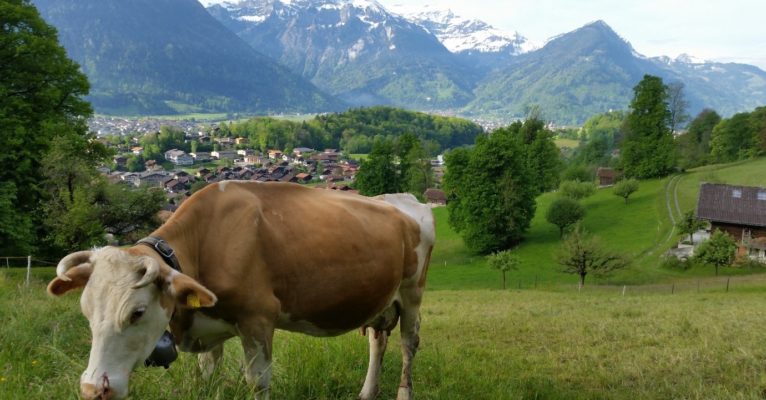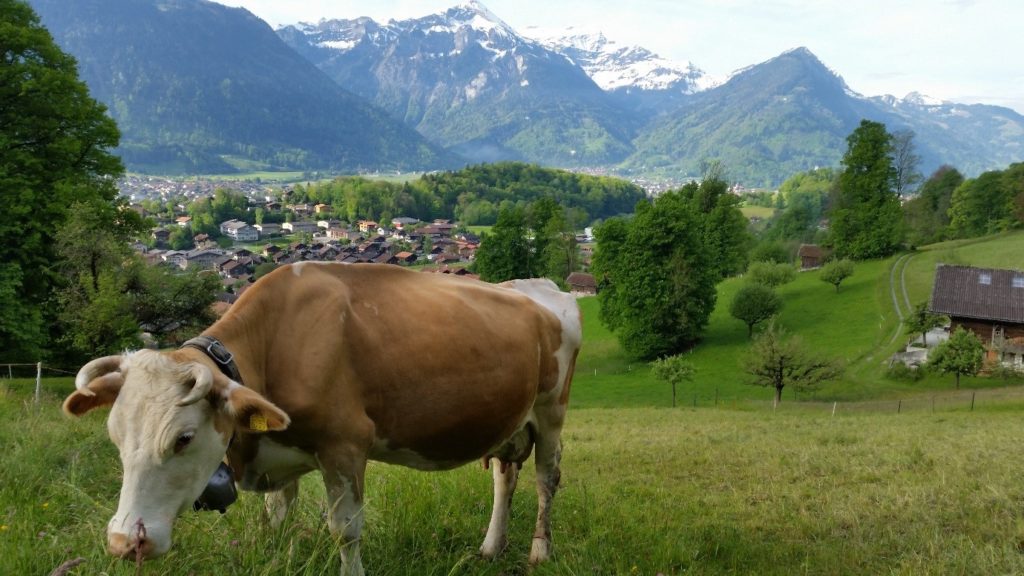The gilded green cage: Swiss agricultural policy and lessons for Brexit Britain

Switzerland sits outside the European Union (EU) and its’ much critiqued Common Agricultural Policy (CAP). From this position, Switzerland has developed an agricultural policy that prioritises environmental delivery. Undertaking a similar change is undoubtedly the biggest environmental opportunity for the UK as it leaves the EU. The generous but demanding system that the Swiss have created, is one pathway that the UK might pursue.
For that reason, and as part of a Nuffield Farming Scholarship I spent 10 days in Switzerland meeting with officials, politicians, stakeholders and farmers exploring their farming policy and the lessons for Brexit Britain. This blog summarises the Swiss system and what the UK can learn from it (a fuller analysis is available here).
What is Swiss Agricultural Policy?
The OECD ranked Switzerland as the country with the highest Producer Support Estimate (PSE) in its 2016 Agricultural Policy Monitoring and Evaluation. PSE is the total amount of transfers from consumers and taxpayers to agricultural producers including direct support (subsidy) and border protections. The latest policy, Politique Agricole 2014 (PA14), repurposed the sizeable federal agricultural budget to create seven direct payment programmes for Swiss farmers to apply for.
To access any support the farmer must first provide ‘Proof of Ecological Performance’ (PEP) which was the inspiration for the EU’s (less robust) cross-compliance and Greening.
Swiss farmers must meet the following PEP requirements before accessing any support:
Crop rotation – Have a minimum of four crops in rotation. Includes limits for each crop
Water and soil protection – Farmers must have soil cover after August 31 and have identified measures to reduce soil erosion (where necessary)
Biodiversity area – 7% of the holding must be allocated as a biodiversity habitat (15 eligible habitats are defined)
Animal welfare – Retaining relevant veterinary records and demonstrating ‘good disease management’
Pesticide use – Requires a farm specific integrated, pesticide management plan, sprayer testing and competence certificates as well as buffer strips next to watercourses and roads
Nutrient balance – Nitrogen and Phosphorus must be balanced at farm level (+/- 10%). Decadal soil analysis is also required.
If a farmer agrees to meet PEP across their farm, they can then access the available programmes. Three of these are primarily income support. The remaining programmes provide additional funding for biodiversity, landscape features and specific production systems (such as high animal welfare, or low chemical input).
Compared to the CAP, PA14 is focused, ambitious and prioritises environmental delivery. It is proof that outside of the EU, the UK can do better. It is however not perfect and is not a direct model for the UK.
What can the UK learn from Switzerland?

Swiss farming is dominated by a subsidy support system that maintains farms, which would otherwise be uneconomic.
1. Agricultural policy based on public good delivery is possible
The Swiss experience demonstrates it is possible politically, technically and within World Trade Organisation (WTO) rules to create a system that supports farmers and delivers for the environment.
2. Devolve, within a federal framework
Switzerland is incredibly devolved with the Federal Government’s exclusive responsibilities being limited to the military, international trade and agriculture. Switzerland’s 26 canton’s have substantive powers in most policy areas, but within agricultural policy they are primarily implementers. The federal level sets the budget, payment rates and much of the details of the policy. This system has survived due to the need to ensure consistency across Switzerland and the strong link between agricultural support / international trade and border protections.
If hyper-devolved Switzerland has a federal framework for agriculture, it would seem that such a framework is consistent with the concept of subsidiarity and that they UK should therefore adopt a similar model.
3. Localise
Swiss farms range from the pluvial plains through rolling hills (jura) to alpine pasture. Swiss policy accounts for these differences by defining and differentiating between three biogeographic regions. Cantons also have a role in setting local priorities for the thematic programmes.
The UK’s landscapes are more diverse than Switzerland’s, and looking to create some regional / local / catchment differentiation would seem likely to improve the environmental efficacy of any policy.
4. Quality matters as much as quantity
The requirement to have 7% of your holding managed for biodiversity is the most eye-catching part of Swiss policy. But many in Switzerland doubt its efficacy as farmers can place that 7% where they want, rather than where it would be most effective and inappropriate areas are often allocated; such as where soil fertility or the effect of shading are too high.
Officials were increasingly interested in improving targeting; possibly through the use of farm level advice and plans. The UK is a world-leader in agri-environmental schemes and finding a way to support wide adoption of quality habitats must be a priority.

Too many Swiss meadows look like the example on the left, with better management officials hope to move more towards the example on the right.
5. Provide advice
Much of the discussion about improving the Swiss system focussed on the need to build the capacity of farmers around public good delivery. The linchpin of this was the advisory services that are publicly supported and coordinated through a federal agency.
The UK has no equivalent and tends to rely on commercial or charitable groups to provide advice. If the UK looks to make a substantive reform then it is not unreasonable to also provide additional resources to support the sector in making the best of that reform.
6. Allow farmers to specialise in public good delivery
One of the tensions in Swiss policy is the extent to which farmers can become primarily public good farmers. In discussions with officials from the Federal Office for the Environment there was some frustration that farmers were not able to make delivering biodiversity or other public goods the priority for their farm business. The barrier is a rule created by the Federal Office for Agriculture that limits total payments under environmental schemes to a percentage of the holding (either 50% or 20%).
Officials in the Federal Office for Agriculture were unapologetic about the limits. The Swiss constitution includes food security as one of the three objectives of agricultural policy – for instance one of the three income support programmes is titled ‘payment for ensuring food supplies’ (the others are ‘transition payments’ and ‘farmland payments’). The Federal Office for Agriculture had therefore imposed this limit as apparently ‘some farmers weren’t producing anything’. By which they meant any food.
Within the UK context where many environmental trends such as farmland bird index and soil quality are in decline and where Governments have historically been less concerned about food security, allowing farmers to focus on public good delivery seems sensible. This could be changed over time as environmental indicators, the UK’s self-sufficiency potential or available budgets change.

Swiss farmers have huge potential to deliver biodiversity, landscape and cultural benefits. But ‘food security’ and production is also part of the policy and supported by the Swiss population (Jonathan Baker).
7. There’s more to farming than the environment
I was struck by how hemmed in many of the farmers felt by the policy. Technically the programmes are voluntary but economically most farmers have few options. The result is a farming sector which, as one official told me, “has yet to accept its role as a provider of public goods”. Farmers muttered that they don’t “want to be the gardeners of Switzerland”; I’ve heard similar concerns in the UK.
The lack of choice and resultant resentment towards the environmental policies undoubtedly reduces their efficacy. The UK should create a system that is flexible and adaptive enough that farmers can pursue different business models.
About the author
Jonathan Baker is a Senior Policy Adviser at the Country Land and Business Association and current Nuffield Farming Scholar. For more on agricultural policy in Switzerland, or the Japan, Korea, New Zealand and Norway visit Jonathan’s blog – https://nuffieldjbaker.wordpress.com/ or twitter @jojabaker





Alastair Leake
5th September 2018 at 2:13 pmThis is an excellent blog highlighting the strengths and weaknesses which we would do well to take heed of as we design our own schemes.
I would be interested to know what the inspection regime/enforcement is for the “Proof of Ecological Performance” (PEP) component? There is an aspiration to remove the so-called “Cross Compliance” from any new UK scheme but I’ve yet to hear if that also means ditching these requirements. Some we might wish to ditch – they deliver little; others we most definitely would not.